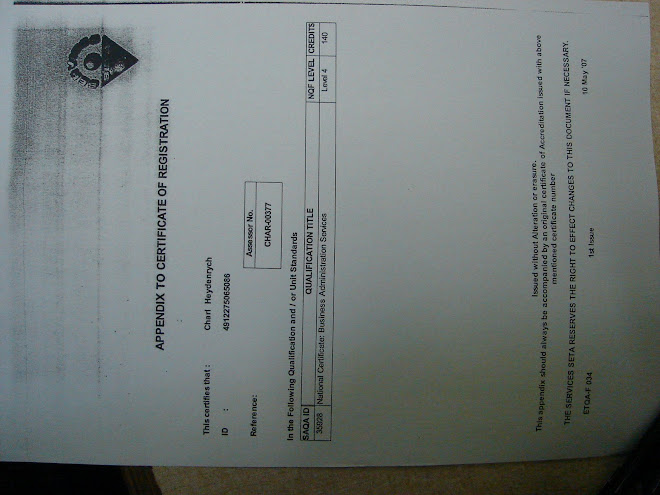1. The Attorney receives instructions to attend to the transfer (normally from the seller or seller's agent).
2. The attorney then requests the original title deed, original mortgage bond and the cancellation figures from the existing bond holder. The cancellation figure is the amount which the existing bond holder requires to be paid before it will cancel the bond over the property.
3. Requests a statement from the local authority (and/or body corporate/managing agent setting out the rates and taxes payable for a period of approximately three months in advance (the deeds office are lately wanting six months! (is this true - if it is then we should complain/resist since it adds another cost to the system which will make trade more difficult). No transfer can be effected until the Registrar of Deeds is satisfied that the rates and taxes and other charges relating to the property have been paid up to the date of transfer.
4. Obtain the relevant information from the purchaser regarding where the bond has been granted.
5. Obtain payment of the deposit in terms of the agreement of sale (if applicable).
6. Once the Purchaser's bond has been granted, one then has to request guarantees from the Attorneys who are attending to the registration of the bond and draw the transfer documents. The guarantees are letters from the financial institution concerned guaranteeing that payment of certain monies will be made on registration of the property. One of the guarantees is utilised to guarantee the payment to the existing bond holder in respect of the cancellation figures referred to in (2) above.
7. Call upon the Purchaser and the Seller to attend to sign the documents drafted to give effect to the transfer of the property. Part of these documents relate to FICA and the parties need also to declare solvency and so on. The attorney will explain these to the signatories. The Purchaser is required to pay the transfer duty, transfer fees and other costs at the time when the documents are signed. The figures are standard and the purchaser should be made aware of these at time of purchase. There are many websites where one can obtain these figures.
8. The transfer duty is then paid to the Receiver of Revenue in order to obtain a transfer duty receipt as proof of such payment.
9. Payment is made to the local authority of the rates and taxes as per the statement obtained in terms of (3) above in order that one can obtain a clearance certificate as proof that such rates and taxes have been paid.
10. Upon receipt of the guarantees from the bond attorneys the guarantees which are required to cancel the existing bond are sent to the attorneys attending to the cancellation of the bond.
11. Once the transfer duty receipt and a clearance certificate have been obtained, arrangements are made with the Attorneys attending to the registration of the Purchaser's bond and the attorneys attending to the cancellation of the existing bond to have all the documents lodged simultaneously in the Deeds Office.
12. After examination of the documents by the Deeds Office (which currently takes approximately 7 – 10 working days) the transfer of the property in the name of the new owner will be registered.
13. Upon registration of the transfer in the Deeds Office the Purchaser then becomes the registered owner of the property.
14. The guarantees are then presented at the various financial institutions and after the guarantees have been cashed, the Seller receives payment of the balance of the purchase price after payment of the monies which have to be paid on behalf of the Seller. This normally takes place on the first working day after the registration date.
This process is not always clear sailing but if all parties provide the necessary information timeously, the transfer attorney is skilled, the local authority is other than Johannesburg(!) things will happen.

